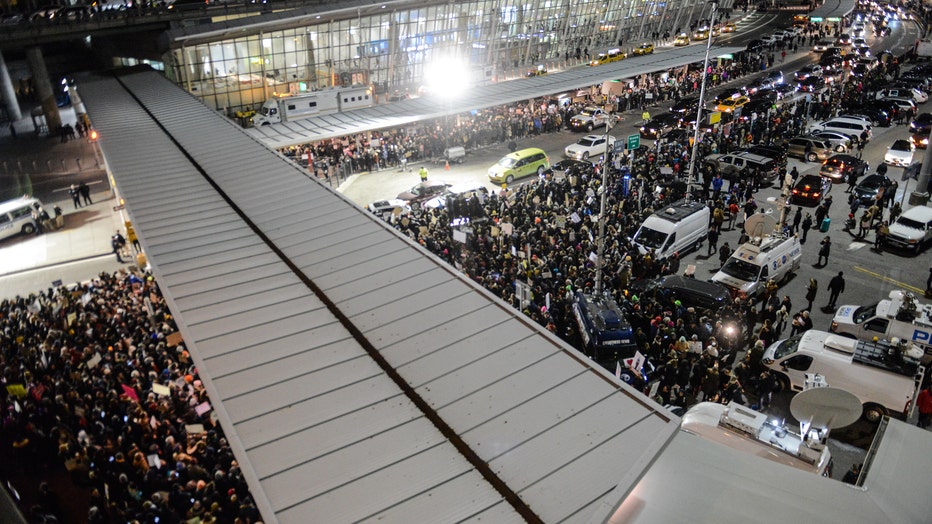#DeleteUber signals a high stakes era for corporations under President Trump


Protestors rally during a demonstration against the new immigration ban issued by President Donald Trump at John F. Kennedy International Airport on January 28, 2017 in New York City. (Photo by Stephanie Keith/Getty Images)
By Avi Asher-Schapiro
Barely a week into his presidency, Mr. Donald Trump, the nation's first billionaire CEO president, started getting flack from his peers among the nation’s wealthiest 1 percent.
Since President Trump issued an executive order on Friday that paused the United States refugee program and restricted travel for citizens from seven Muslim-majority countries, a chorus of CEOs — including Netflix’s Reed Hastings, Apple's Tim Cook, and Facebook’s Mark Zuckerberg — trashed the policy in public.
The so-called “Muslim ban” didn’t just ruffle the feathers of oligarchs of Silicon Valley, a hotbed of support for President Trump’s onetime opponent Hillary Clinton: Ford CEO Mark Fields said it went “against our values as a company,” Starbucks CEO Howard Schultz repudiated the order with a plan to hire 10,000 refugees, and Nike CEO Mark Parke implied the ban was a form of “bigotry.”
These criticisms came after a weekend of protests rocked airports across the country, with thousands flocking to the arrival gates of international hubs in San Francisco, New York, Chicago, and Los Angeles, demanding that travelers detained at those airports be freed.
In siding with those protesters, CEOs are breaking—and perhaps refashioning — fundamental rules of brand management and advertising strategy, says Tim Wu, a law professor at Columbia University and the author of The Attention Merchants: The Epic Scramble to Get Inside Our Heads, a history of the advertising industry.
“ try to stay away from divisive issues that could alienate consumers,” Wu explains. “That’s been accepted wisdom since World War II.”
The ongoing corporate pile-on against President Trump’s executive order, Wu says, is “unprecedented in the history of the United States.”
Corporations have alway lent their support to pet social issues, motivated by some unknowable mixture of genuine concern and cynical public relation strategy. Ben and Jerry’s pours money into the Children’s Defense Fund, Walmart gives to battered women’s shelters and funds pre-kindergarten programs in Arkansas. And while companies also write hefty checks to influence public policy, corporate lobbying on controversial issues — like relaxing environmental regulations, or carving out a corporate tax-loophole — is not something that’s typically bandied about in public.
But the Mr. Trump presidency could very-well inaugurate a new era for corporate communications, where companies are under pressured to quickly stake out public positions in relationship to the president’s agenda.
The stakes are high: take what happened with ride-sharing giant Uber over the weekend. On Saturday evening, the New York City taxis union announced a work stoppage at JFK airport to show their support for thousands of protesters massing against President Trump’s executive order. Uber, meanwhile, kept operating, even tweeting out that the company was turning off surge pricing at JFK.
Soon thereafter, Dan O’Sullivan, a freelance writer in Chicago who opposes President Trump’s agenda, began tweeting under the hashtag #DeleteUber, urging those upset about the executive order to boycott the company. In December, Uber’s CEO Travis Kalanick agreed to join a board of business leaders advising President Trump; O’Sullivan interpreted Uber’s decision to keep operating on Saturday — even during a taxi driver solidarity strike — as further evidence of Uber’s complicity with President Trump’s policy agenda.
“While these massive protests are going on and taxi drivers are rallying in support, Uber is glibly going on about its own business,” O’Sullivan said. “They broke the strike by continuing to operate.”
O’Sullivan’s hashtag quickly spawned a national boycott of Uber — the backlash was so intense that on Monday the company had to reconfigure and streamline its process for deleting accounts.
Uber, for its part, insists it had no intention of breaking Saturday’s strike. CEO Kalanick released a statement before the protesters started, calling the travel ban “unjust” and offering support to drivers impacted. Uber did not, however, respond to requests for comment about whether Kalanick intends to stay on President Trump’s business advisory committee.
“They want to have their cake and eat it too,” O’Sullivan said. “They think they can advance their business interests as cronies of Trump and still claim they are cool to their customers upset by the ban.”
As Uber was hit with this harsh public relations blow, its main rival, Lyft, saw an opening, and announced it would donate $1 million over the next four years to the American Civil Liberties Union to fight President Trump’s executive order in court. Riding a wave of public disgust over Uber, Lyft became the number one most downloaded app over the weekend. Ironically, some of Lyft’s major investors are President Trump allies, including longtime backer Carl Icahn, who has $100 million invested in Lyft, and was recently tapped by President Trump to help rollback government regulations.
For now, public backlash against President Trump-linked business appears to be somewhat arbitrary. L.L. Bean faced calls for a boycott in January after it was revealed that the founder’s granddaughter, Linda Bean, gave money to the President Trump campaign. After an executive at the shoe manufacturer New Balance said the Mr. Trump presidency was a “move in the right direction,” some customers circulated photos of New Balance shoes thrown in the trash. Yet there’s been no comparable call to avoid popular companies, like Spotify, funded by the billionaire Silicon Valley investor and Trump confidente Peter Thiel — who also sits on the board of Facebook. On the other side, some Trump supporters started promoting the hashtag #BoycottStarbucks in response to the company’s pledge to hire refugees.
While the airport protests and push-back on Uber might give the impression that President Trump’s executive order is intensely unpopular, that’s not quite the case. According to a Reuters/Ipsos poll released on Monday, 49 percent of Americans agreed with the order—and 41 percent disagreed. The data is not broken down demographically, but the largest protests this weekend occurred in major cities, where President Trump is least popular. In the rural heartland that swept Mr. Trump into the presidency—and where ride-sharing companies like Uber and Lyft are less prevalent— the ban is also far less controversial.
What unites Americans here is that everyone is paying attention to the policy: nearly 9 in 10 Americans were aware of the ban and had some opinion about it. By comparison, only 8 out of 10 Americans have an opinion about how the economy is performing.
That may explain why so many companies are weighing in, Wu says. Experts in modern advertising have recently began to identify “attention” as one of the scarcest and most sought-after contemporary resources, as a myriad different screens and alerts vie for consumers’ eyeballs. Rising to the top of that "attentional economy" has become advertisers’ main objective.
“There’s a sense that Trump—and what he does— is so absolutely dominating the attentional economy,” he says. “People feel that to be heard at all, they need to talk about Trump.”
For some companies whose customer demographics skew anti-President Trump, creating distance from the president may become part of doing business. “Uber may feel they that their customer base is so clearly within the demographic that voted against Trump, that they need to draw a sharp line,” Wu explains. But by distancing themselves from Trump, companies play a dangerous game. “It means that to some degree, they are willing to write off huge part of the country,” Wu says. “It’s kind of amazing—we live in a such a polarized period.”
For O’Sullivan, the success of #DeleteUber — and the disgust President Trump generates among certain segments of the population — presents a new window of opportunity. “There are many companies that claim they are cool — and that they are your “pals” — but actually they are going to be sucking up to basically the most unlikeable person in America,” he said. “It helps sharpen that contradictions between what some companies say, and what they do.”

